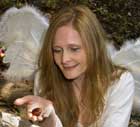The Island of the Fay- - Edgar Allan Poe, 1841
Dear David and Myrea:
I thought you might like to include this excerpt on your wonderful website.
John —–Dear John we would be delighted to add these powerful mystical yet enchanting words to your pages at your request, David and Myrea
“If ever island were enchanted,” —said I to myself, — “This is it. This is the haunt of the few gentle Fays who remain from the wreck of the race. Are these green tombs theirs? —or do they yield up their sweet lives as mankind yield up their own? In dying do they not rather waste away mournfully; rendering unto God little by little of their existence, as those trees render up shadow after shadow, exhausting their substance unto dissolution? What the wasting tree is to the water that imbibes its shade, growing thus blacker by what it preys upon, may not the life of the Fay be the death which engulfs it?”
As I thus mused, with half-shut eyes, while the sun sank rapidly to rest and eddying currents careering round and round the island, bearing upon their bosom large dazzling, white flakes of the bark of the sycamore—flakes which in their multiform positions upon the water, a quick imagination might have converted into anything it pleased—while I thus mused, it appeared to me that the form of one of those very Fays about whom I had been pondering, made its way slowly into the darkness from out the light at the western end of the island. She stood erect, in a singularly fragile canoe, and urged it with the mere phantom of an oar. While within the influence of the lingering sunbeams, her attitude seemed indicative of joy—but sorrow deformed it as she passed within the shade. Slowly she glided along, and at length rounded the islet and re-entered the region of light. “The revolution which has just been made by the Fay,” continued I musingly—“Is the cycle of the brief year of her life. She has floated through her winter and through her summer. She is a year nearer unto Death; for I did not fail to see that as she came into the shade, her shadow fell from her, and was swallowed up in the dark water, making its blackness more black.”
And again the boat appeared, and the Fay; but about the attitude of the latter there was more of care and uncertainty, and less of elastic joy. She floated again from out of the light, and into the gloom (which deepened momently) and again her shadow fell from her into the ebony water and became absorbed into its blackness. And again and again she made the circuit of the island, (while the sun rushed down to his slumbers) and at each issuing into the light, there was more sorrow about her person, while it grew feebler, and far fainter, and more indistinct; and at each passage into the gloom, there fell from her a darker shade, which became whelmed in a shadow more black. But at length, when the sun had utterly departed, the Fay, now the mere ghost of her former self, went disconsolately with her boat into the region of the ebony flood, —and that she issued thence at all I cannot say, —for darkness fell over all things, and I beheld her magical figure no more.
Excerpt from The Island of the Fay, by Edgar Allan Poe, 1841.






 Del.icio.us
Del.icio.us


